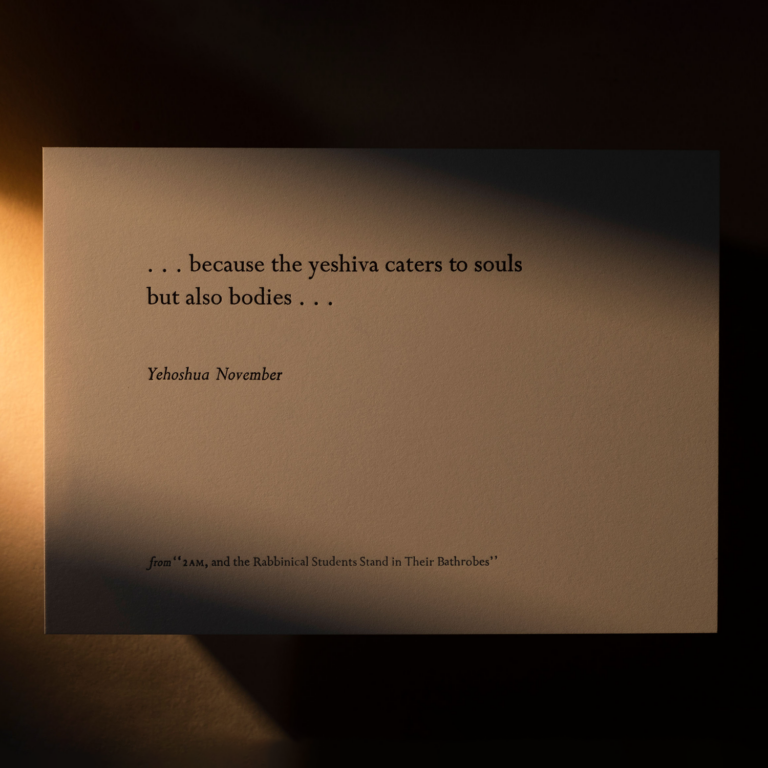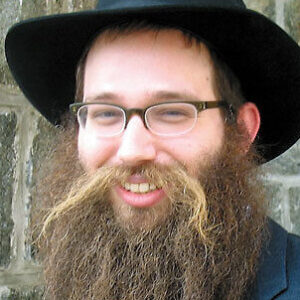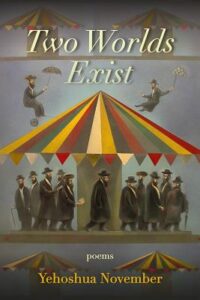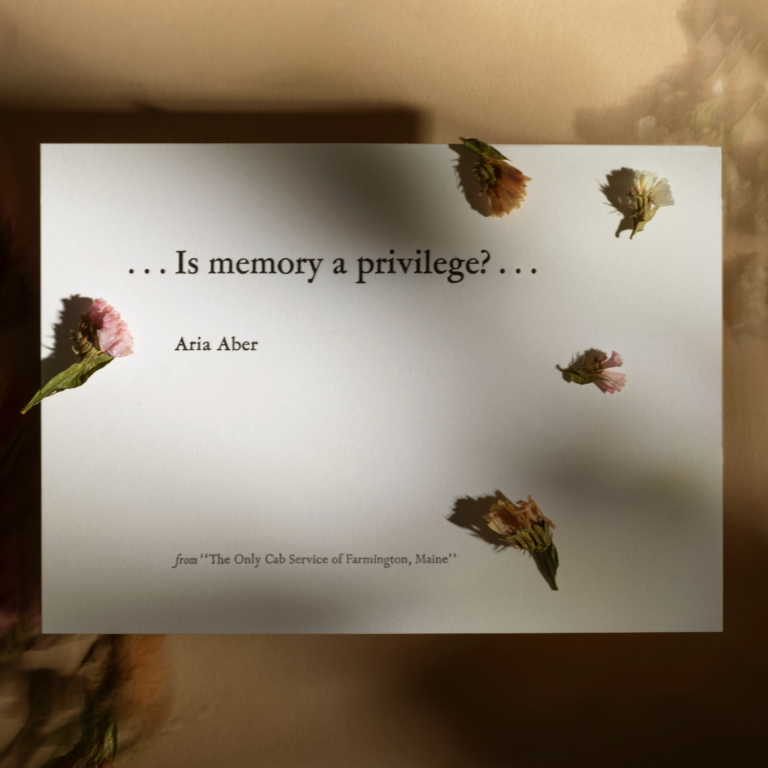Yehoshua November
2AM, and the Rabbinical Students Stand in Their Bathrobes
Yeshiva students stand around in the middle of the night while firemen find the cause of the alarm. It’s a student — distressed by distressing news at home. The teachers cancel classes for the morning after. A poem can describe one thing, but point to another, and beyond the drama of this 2 a.m. scene is a question about whether the presence of God can dwell among those plagued by sadness, or whether God only dwells there.

Letterpress prints by Myrna Keliher | Photography by Lucero Torres
Guest

Yehoshua November is the author of two books of poetry, God's Optimism (winner of the MSR Book Award and a finalist for the L.A. Times Book Prize) and Two Worlds Exist (a finalist for National Jewish Book Award and the Paterson Poetry Prize).
Transcript
[music: “Praise the Rain” by Gautam Srikishan]
Pádraig Ó Tuama: My name is Pádraig Ó Tuama, and I grew up in a very particular religious tradition, Irish Catholicism. And I’m not sure if I can blame other people for this, or just my own neuroses, but I think I always was worried that I didn’t have the right answer to questions of religion. And my life was changed when I started to learn how to read the bible in the company of Jews, who were saying to me, “There isn’t only just one answer to one question. There’s multiple answers to multiple questions, and you need to find a way to hold multiple things together as possibilities of interpretation and truth at the same time.”
“2AM, and the Rabbinical Students Stand in Their Bathrobes,” by Yehoshua November:
“2AM, and the rabbinical students stand in their bathrobes
at the edge of the yeshiva parking lot, watching
the practiced motions of muscular firemen disembarking
from their engine. Soon, it will be determined
the youngest student in the building
pulled the basement alarm
after learning, over the dormitory pay phone,
his parents, back in Baltimore, intend to end
their nineteen year marriage before Passover.
The only one the rabbis have not accounted for
crouches in his closet behind a row of black sports coats.
And because the yeshiva caters to souls
but also bodies,
the early morning mysticism class
on why the Divine Presence cannot dwell
amongst those plagued by sadness
has been cancelled.”
[music: “True Shape” by Blue Dot Sessions]
So this poem of Yehoshua November’s is a really tender poem, filled with story and filled with what you’d call, in poetry, “furniture.” If a poem is a room, then a poem always is filled with furniture in the room, things that are happening, things you can see, things you can feel, emotions, even.
And the story in the poem is straightforward. It’s 2 a.m., there’s firemen in an empty yeshiva — a seminary for Jewish students, and there is a fire alarm and the desire to find out what’s happened, and there, of course, is the interrupted night. Everybody’s out in those bathrobes. And there’s the worry about whether they’ll be able to get back in. There’s the interrupted schedule and the unfolding story. The next morning’s plans are changed. And then there is the backstory to this particular student, and his anxiety, and his hiding behind the sports coats in the closet, and the story of his parents, too.
It’s a poem that’s full of characters. It’s really short, but it’s a very well-populated poem. Just as a list of the characters, there’s the rabbinical students and the “muscular firemen” and the youngest student, and then there’s the youngest student’s parents, as well, back in Baltimore. And there’s the rabbis, who are trying to account for all the students. And then there’s whoever it is, whether that’s a rabbi or somebody else, who makes the decisions about the class the next morning.
[music: “Into the Earth” by Gautam Srikishan]
This is a poem mostly about men, although there is the mother of the distressed student, mentioned quietly in the poem. And so that’s a real particular part of an experience in this yeshiva that is powerful in this poem. Yehoshua November is a Hasidic Jew, and so the poems, in this particular collection, anyway, center around religious culture. There is a really powerful presence of American Hasidic Jewish experience that’s brought to the forefront in so many of these poems; stories about family, stories about study, stories about texts, stories about God, stories about seminary.
So, as well as this being a poem that’s set in a predominantly male experience of 2 a.m. in this particular seminary, with this particular experience, it’s also a poem about tenderness and a poem about change. There is the student’s distress. There is the student’s fear. The student perhaps doesn’t know how to give voice to his own distress; he doesn’t know how to sound his own alarm. So he sounds another alarm, a literal alarm, an alarm that causes everybody to be evacuated from a building. In a certain sense he’s externalizing what’s happening internally for him. And this distress is something that is going to cause everybody to have to reorient around him.
I have a friend who’s a fireman, and one of the things that he knows is that, in going to a site of an alarm, that there is, of course, the emergency to be responded to, but there’s the emergencies that are happening inside people, also. And this poem is so wise about this. These firemen must be so used to knowing that sometimes, an alarm means other things than just a fire.
[music: “Quarry Clouds” by Blue Dot Sessions]
In a strange way, the poem says at the end that, you know, “the yeshiva caters for soulsbut also bodies,” and so they cancel the class the next morning, as if that’s only practical. But one of the things that I think is really powerful in this poem is that it is also the soul of him that is being catered to by this class being canceled the next morning.
The class for the next morning was going to look at “why the Divine Presence cannot dwell” among “those plagued by sadness.” And the fact that they cancel that class the next morning isn’t, I don’t think, just because everybody’s going to be tired from having been interrupted at 2 a.m., but also because they’ve learned something. Here’s a distressed student, hiding in a closet, surrounded by black sports coats, because of sadness that he can’t cope with.
Somehow, I think, perhaps the class needed to learn something — that if the Divine Presence can’t dwell among those plagued by sadness, then they’re in trouble. And perhaps the class learned how to pray that the divine presence — that God — could dwell among those plagued by sadness, because they’d had an experience that night about what it’s like to have witnessed among them somebody who was feeling so isolated, so distressed, and so sad that theology itself, that classes themselves, needed to learn from this visible witness among them about the need for the divine presence; that this young fella had tried to hide, but actually needed to be found, and that that is evidence as to why that class — pastorally, from the point of view of the soul and from the point of view of theology — why that class needed to be canceled.
[music: “First Grief, First Air” by Gautam Srikishan]
The question as to religious formation in the context of soul and body that is brought into the final part in this poem, is a really interesting one. There’s long histories in all religions, I think, as to the relationship of the soul to the body. You know, is the body just a temporary house for the eternal soul? Is the soul a part of the body? How do these two aspects of the experience of being human, soul and body, as lots of religions would describe it, how do these two aspects co-dwell in this shape of the body? And different religions will approach it in different ways; and even internally, in different religions, different people will understand that question in different ways.
But this poem is, I think playfully, highlighting the fact that you can’t separate them. And I think that’s very, very helpful and is always a very good grounding and basic grounding. There’s the description of the students in their bathrobes. So, right from the word go, there is the idea of the yeshiva, as well as, then, the fact that yeshiva is filled with bodies — bodies that wear different things at different times of the day, and bodies that need rest and need sleep — and this is being interrupted. And that, I think, is a really practical interruption to sometimes abstract questions about the delineation between soul and body.
[music: “Every Place We’ve Been” by Gautam Srikishan]
Hasidic Jews don’t say God’s name. One of the ways of referring to God is to speak of Hashem, which means “the name.” And the courtesy and respect and deference of not speaking God’s name means that whenever we speak about Hashem, “the name,” that there’s a gap about how we speak, because there’s an awareness of the name, or the many names, of God, as well as, then, that profound practice of not saying the name of God.
So, therefore, that implies that when we speak about the name of God that there is so much that is unknowable. And this, I think, is the gap in this poem, is that this student, strangely, in his own distress, he raised an alarm in public because he didn’t know how to raise it in himself; that he is stepping into that gap between the unknowability of God and hoping, I think, that perhaps God can be found amongst those like him, plagued by sadness, because the distressed student is the teacher, even though he might not feel like he’s the teacher.
He seems to want to hide; he’s gone to the basement, and now he’s in this closet. But he has carried sadness and worry in his body, and he’s externalized it, and he’s put all those other people — the firemen, the other students, the teachers, the rabbis — into a situation where they have to find him. And if they can find him and understand him, then surely, God can. And so in a certain sense he is almost like a divine interruption to the abstraction of that class that says that God can’t dwell where sadness is. And he, therefore, is the site of education and learning — frustrating as that might be, annoying as that might be for everybody else in the class, or the teachers, or whoever had to reschedule everything for the next morning. His interruption, his distress, is an invitation into a deeper way of understanding the theological considerations that they’re gathering themselves around.
And that, I think, is a helpful reminder about how profound inconveniences like this might actually carry something deeper for everybody to reflect on, rather than just, How do we cope with this distressed person amongst us?
[music: “First Grief, First Air” by Gautam Srikishan]
“2AM, and the Rabbinical Students Stand in Their Bathrobes” by Yehoshua November:
“2AM, and the rabbinical students stand in their bathrobes
at the edge of the yeshiva parking lot, watching
the practiced motions of muscular firemen disembarking
from their engine. Soon, it will be determined
the youngest student in the building
pulled the basement alarm
after learning, over the dormitory pay phone,
his parents, back in Baltimore, intend to end
their nineteen year marriage before Passover.
The only one the rabbis have not accounted for
crouches in his closet behind a row of black sports coats.
And because the yeshiva caters to souls
but also bodies,
the early morning mysticism class
on why the Divine Presence cannot dwell
amongst those plagued by sadness
has been cancelled.”
[music: “Praise the Rain” by Gautam Srikishan]
Chris Heagle: “2AM, and the Rabbinical Students Stand in Their Bathrobes” comes from Yehoshua November’s book Two Worlds Exist. Thank you to Orison Books, who gave us permission to use Yehoshua’s poem. Read it on our website, at onbeing.org.
[music: “Praise the Rain” by Gautam Srikishan]
Poetry Unbound is: Gautam Srikishan, Erin Colasacco, Eddie Gonzalez, Lilian Vo, and me, Chris Heagle.
Our music is composed and provided by Gautam Srikishan and Blue Dot Sessions.
This podcast is produced by On Being Studios, which is located on Dakota land. We also produce other podcasts you might enjoy, like On Being with Krista Tippett, Becoming Wise, and This Movie Changed Me. Find those wherever you like to listen, or visit us at onbeing.org to find out more.
Books & Music
Recommended Reading
The On Being Project is an affiliate partner of Bookshop.org and Amazon.com. Any earnings we receive through these affiliate partnerships go into directly supporting The On Being Project.







